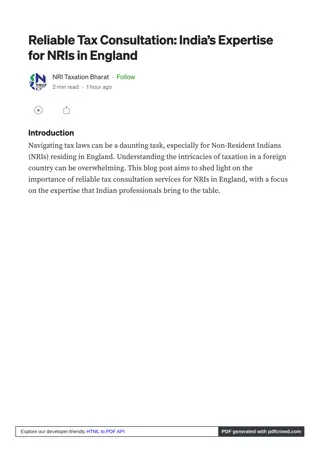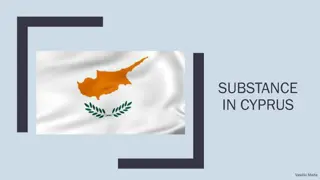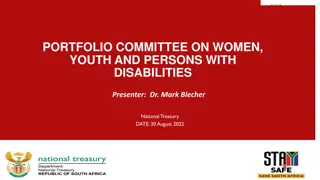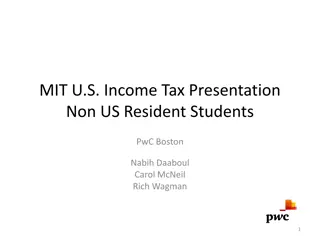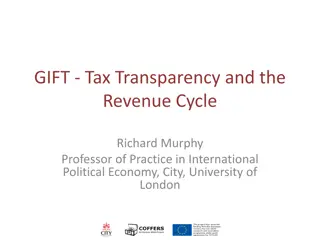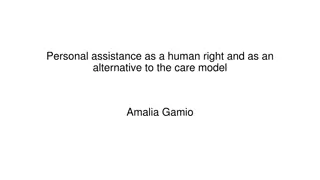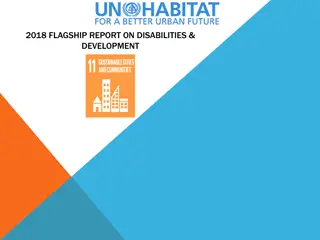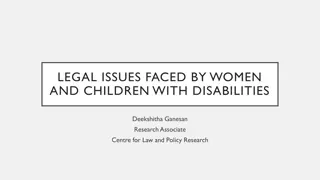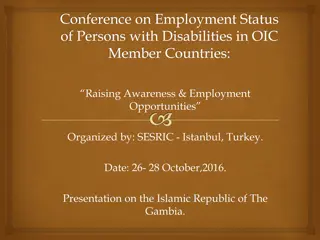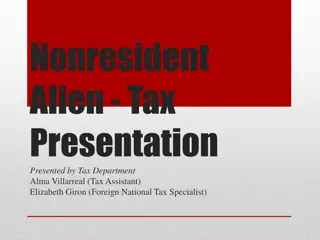Impact of UK Tax Policies on Persons with Disabilities in the Global South
Tax policies in the UK have significant implications on the rights of persons with disabilities in the Global South. These policies influence access to social and economic rights, with a key focus on resource dependence, revenue mobilization, and budget transparency. Additionally, the impact of tax treaties and the extraterritorial obligations of states further shape the economic landscape for individuals with disabilities in developing countries.
Download Presentation

Please find below an Image/Link to download the presentation.
The content on the website is provided AS IS for your information and personal use only. It may not be sold, licensed, or shared on other websites without obtaining consent from the author. Download presentation by click this link. If you encounter any issues during the download, it is possible that the publisher has removed the file from their server.
E N D
Presentation Transcript
HOW UK TAX POLICIES AFFECT THE RIGHTS OF PERSONS WITH DISABILITIES IN THE GLOBAL SOUTH
Access to social and economic rights in particular are often resource dependent including health, education, social protection and other areas. Total revenue as a % of GDP in the global South vary from 9% of GDP in Bangladesh, 11% in Guatemala, 14% in Ghana to 18% in Kenya, while OECD country average is 33% impact on potential for advancing rights of persons with disabilities Global South countries are more dependent on corporate taxes in mobilising revenue. African countries mobilise 19% of total tax from Corporate Taxes, in Latin America and Caribbean 16%, and in OECD countries this was 10% RIGHTS REQUIRE RESOURCES 18-02-20162
We also need to know where are the revenue leakages due to international taxation, which the IMF estimates constitute at least $US200-US$500bn We also should know how much global South countries lose in terms of Illicit Financial Flows (IFFs) of unrecorded, mispriced trade and investment flows, e.g. African countries lose an estimated US$88bn We also lack budget transparency esp. in terms of disaggregation of beneficiaries in terms of disability, targeted budget spend, and budget spending aligned with addressing disabilities. TRANSPARENCY OF BOTH REVENUE AND SPENDING SIDE OF BUDGETS 18-02-20163
States create tax policies that aim to enhance both economic growth, and advancing equity but there are trade-offs between these two aims, both domestic/ and international Lowering corporate tax rates reduce available public revenue to address rights and SDGs, and create international tax competition, even if they are announced as investment incentives States have extraterritorial obligations to not harm enjoyment of rights elsewhere, while SDGs recognise the global partnership for development DOMESTIC TAX POLICIES HAVE IMPACTS ON OTHER COUNTRIES 18-02-20164
Tax treaties define taxing rights between global North and global South countries, e.g. on investment income, and revenue e.g. from royalties/ interests/ intra-firm transfers/sale of company assets UK has tax treaties with over 130 countries, 13 of which (e.g. Gambia, Sierra Leone have 0% rated taxes on payment on dividends to shareholders abroad), they restrict the ability of global South countries to tax foreign companies. UK investment treaties also used to seek arbitration when a large multinational company seeks to overturn a tax decision in a global South country (e.g. Nepal-UK tax treaty used to overturn a capital gains tax charge on sale of Nepalese telecom company Ncell in 2016, $US360 million revenue initially foregone) UK S TAX POLICIES THAT HAVE EXTRATERRITORIAL IMPACTS 18-02-20165
UK overseas territory of Cayman islands is number 1 on the Financial Secrecy Index, due to a secrecy score of 76/100 and large volume of flows, while the UK itself is in the 12th UK has a public beneficial ownership (BO) registry since 2016 (among one of the first countries), includes all and entities who own over 25% of company shares, but often owners are foreign registered UK s overseas territories have not yet made their registries public despite commitments from their part to do so by 2023 UK property lacks beneficial ownership information on overseas owners. A bill is in place since 2018, not passed. UK crown dependencies (Jersey, Guernsey, Isle of Man) have no timetable to make their BO registries public UK OVERSEAS TERRITORIES AND CROWN DEPENDENCIES STILL HAVE SECRETIVE LAWS 18-02-20166
18-02-20168 STATE OF BO REGISTRIES
Advocate for greater tax transparency, to know who are real owners of companies, trusts, so we can tackle both corruption and tax abuses to increase revenue and hold economic and political elites accountable Ensure that global North countries like the UK conduct spillover or human rights impact analysis of their tax policies, on global South countries Measure the tax gap or revenue foregone, in order to propose better laws to stop tax abuses, illicit financial flows, compare this to budget lines that contribute to improving of lives of persons with disabilities Link financial and tax transparency with human rights and SDGs and hold governments and private sector accountable via SDG and human rights review and accountability mechanisms Push for better standards at UN, AU, OECD, G20 on these areas on public registries, and just global tax distribution ADVOCACY OPPORTUNITIES 18-02-20169
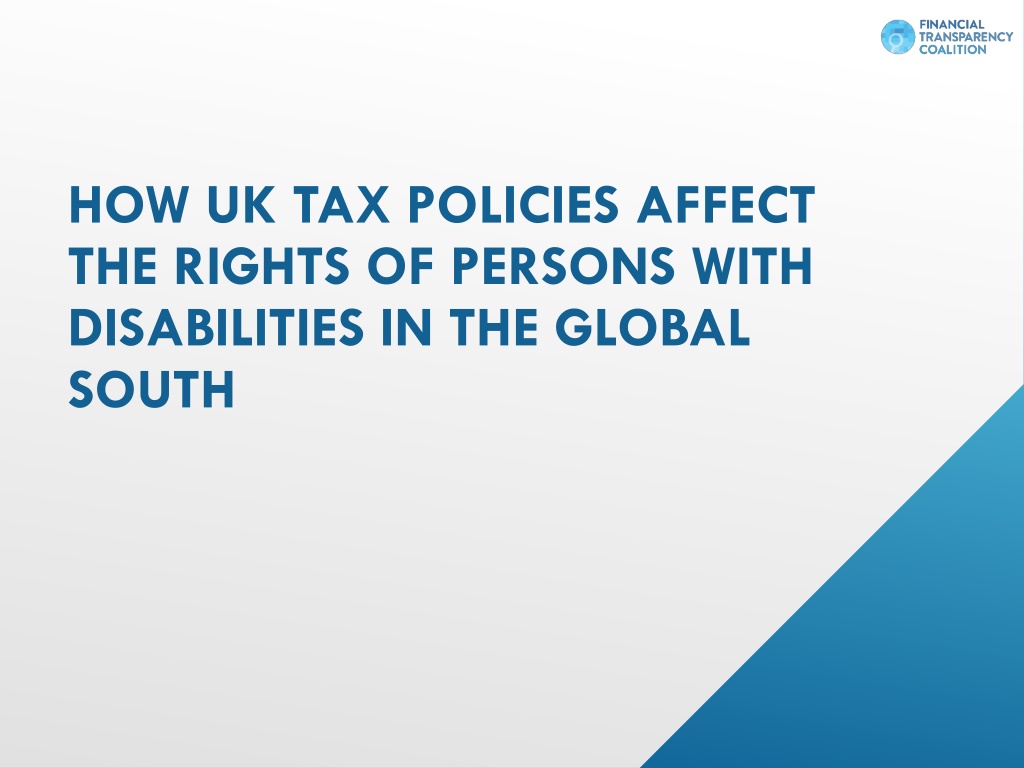
 undefined
undefined









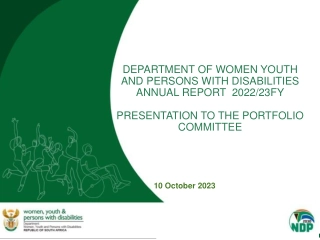

![Town of [Town Name] Real Estate Tax Rates and FY 2024 Budget Summary](/thumb/62211/town-of-town-name-real-estate-tax-rates-and-fy-2024-budget-summary.jpg)
